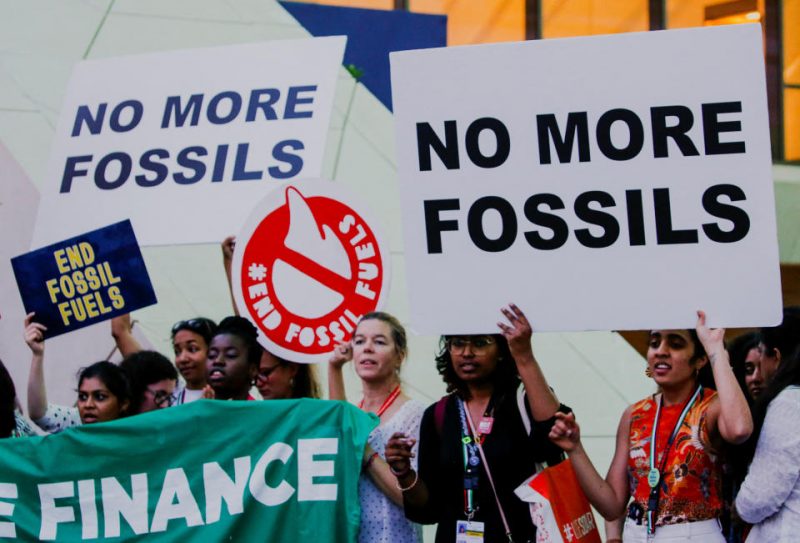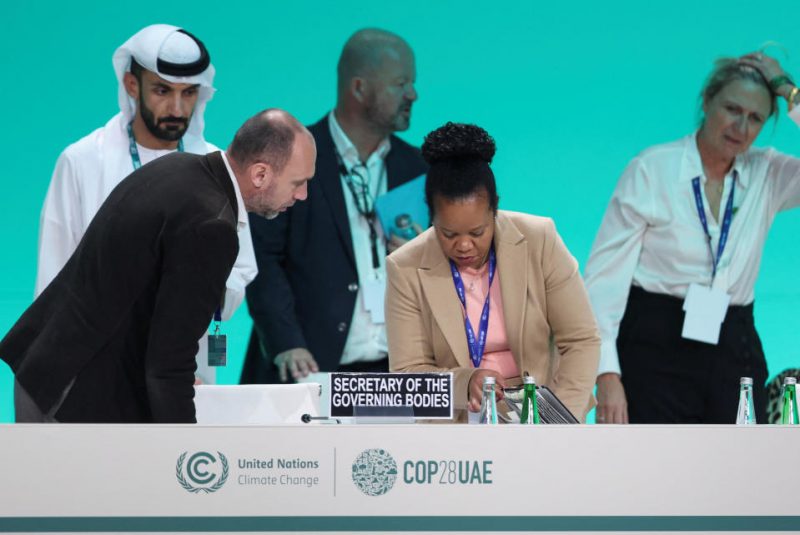Officials from close to 200 countries agreed at the COP28 climate summit on Wednesday to begin cutting consumption of fossil fuels to avert the worst impacts of climate change.
The deal – cheered and hailed as “historic” by some, while damned as “soft” by others – is the first global agreement that promises an eventual end to the use of oil and coal.
Struck in the United Arab Emirates after two weeks of hard-fought negotiations, it aims to send a powerful signal to investors and policy-makers that the world is united in its desire to break with fossil fuels, something that scientists say is the last best hope to stave off climate catastrophe.
ALSO SEE: China, US EV Sales Lead Charge as Electric Revolution Speeds Up
COP28 President Sultan Al Jaber called the deal “historic” but noted that true success would only come when this goal is implemented.
“We are what we do, not what we say,” he told the crowded plenary at the summit. “We must take the steps necessary to turn this agreement into tangible actions.”
Several countries cheered the deal for accomplishing something elusive in decades of climate talks.
“It is the first time that the world unites around such a clear text on the need to transition away from fossil fuels,” Norway’s Foreign Affairs Minister Espen Barth Eide said.
“It has been the elephant in the room. At last we address it head on,” he said.
Island nations say text lacks ambition
More than 100 countries had lobbied hard for strong language in the COP28 agreement to “phase out” oil, gas and coal use, but came up against powerful opposition from the Saudi Arabia-led oil producer group OPEC, which argued that the world can slash emissions without shunning specific fuels.
That battle pushed the summit a full day into overtime on Wednesday.
Members of the Organization of the Petroleum Exporting Countries together control nearly 80% of the world’s proven oil reserves along with about a third of global oil output, and their governments rely heavily on those revenues.
Small climate-vulnerable island states, meanwhile, were among the most vocal supporters of phasing out fossil fuels and had the backing of huge oil and gas producers such as the United States, Canada and Norway, along with the EU bloc and scores of other governments.
“This is a moment where multilateralism has actually come together and people have taken individual interests and attempted to define the common good,” US climate envoy John Kerry said after the deal was adopted.
A representative for the Alliance of Small Island States also addressed the plenary, complaining that the agreement had been gavelled before its delegates had arrived in the room, and criticising the text as unambitious.
“We have come to the conclusion that the course correction that is needed has not been secured. We have made an incremental advancement over business as usual, when what we really need is an exponential step change in our actions,” she said.
But she did not formally object to the pact, and her speech drew a standing ovation.
Danish Minister for Climate and Energy Dan Jorgensen marvelled at the circumstances of the deal: “We’re standing here in an oil country, surrounded by oil countries, and we made the decision saying let’s move away from oil and gas.”
Call to triple renewable energy use
The deal specifically calls for “transitioning away from fossil fuels in energy systems, in a just, orderly and equitable manner … so as to achieve net zero by 2050 in keeping with the science.”
It also calls for a tripling of renewable energy capacity globally by 2030, speeding up efforts to reduce coal use, and accelerating technologies that can clean up hard-to-decarbonize industries.

Now that the deal is struck, countries are responsible for delivering through national policies and investments.
In the United States, the world’s top producer of oil and gas and the largest historical emitter of greenhouse gases, for example, climate-conscious administrations have struggled to pass laws aligned with their climate vows through a politically divided Congress.
US President Joe Biden scored a major victory on that front last year with passage of the Inflation Reduction Act, which contained hundreds of billions of dollars in subsidies for electric vehicles, wind, solar and other clean energy technologies.
Mounting public support for renewables and electric vehicles from Brussels to Beijing in recent years, along with improving technology, sliding costs, and rising private investment have also driven rapid growth in their deployments.
Even so, oil, gas, and coal still account for about 80% of the world’s energy, and projections vary widely about when global demand will finally hit its peak.
OPEC Secretary General Haitham Al Ghais had said in a letter dated December 6 to OPEC members and allies at COP28 that the world should target emissions rather than fossil fuels themselves, rallying them to oppose any deal targeting oil.
Oil producers have argued that fossil fuels can be cleansed of their climate impact by using technology that can capture and store carbon dioxide emissions. But carbon capture is expensive and has yet to be proven at scale.
Many environmentalists say it is a dangerous and misleading fantasy promoted by the oil sector. And in May, a panel of UN experts questioned the technical and economic viability of startups seeking to clean up carbon that’s already been released into the sky.
- Reuters with additional input and editing by Jim Pollard
ALSO SEE:
COP Battle Over ‘Weak’ Draft, Row Over Ending Fossil Fuels
Push for Phase-Out of Fossil Fuels on the Table at COP28
COP28: Over 110 Nations Join Deal to Triple Renewable Energy
US Pledges $3 Billion for Green Climate Fund at COP28
Cities Lead COP28 Climate Change Push as Nations Fail to Deliver
























